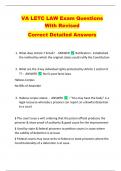VA LETC LAW Exam Questions
With Revised
Correct Detailed Answers
1. What does Article 7 Entail? - ANSWER Ratification - Established
the method by which the original states could ratify the Constitution
2. What are the 3 key individual rights protected by Article 1 section 9
?? - ANSWER No Ex post facto laws
Habeus Corpus
No Bills of Attainder
3. Habeus corpus states: - ANSWER : "You may have the body" is a
legal recourse whereby a prisoner can report an unlawful detention
to a court
§ The court issue a writ ordering that the prison official produces the
prisoner & show proof of authority & good cause for the imprisonment
§ Used by state & federal prisoners to petition courts in cases where
the validity of detention is at issue
§ Federal courts may issue writs to federal or state prisoners where the
Constitutionality of a detention is at issue
,4. What does No Bills of Attainder mean: - ANSWER o Legislative
actions declaring a person or group of people guilty of some crime &
then punishing them without a trial
§ Reinforces the separation of powers since only the Judicial Branch can
try & convict someone
§ Reinforces the concept of Due Process of Law
§ Not really an issue today. Most often used in history to punish those
guilty of treason
5. What Does no Ex Post Facto Laws mean - ANSWER "After the
fact" - A law that retroactively makes an action a criminal offense,
aggravates a crime, or increases punishment after the fact
6. The bill of rights was established in ______ and contains how many
amendments - ANSWER 1791
The first 10 amendments
7. 1st Amendment: - ANSWER Freedom of Speech
congress shall make no law respecting an establishment of religion nor
prohibiting the free exercise thereof; or abridging the freedom of
speech, or of the press, or the right of the people peaceably to
assemble & to petition the Government for a redress of grievances
,8. 2nd Amendment: - ANSWER Right to bare arms
A well-regulated Militia, being necessary to the security of a free State,
the right of the people to keep & bear arms, shall not be fringed
9. 3rd Amendment - ANSWER No Soldier shall, in time of peace, be
quartered in any house, without the consent of the Owner, nor in time
of war, but in a manner to be
10. 4th Amendment - ANSWER The right of the people to be secure
in their persons, houses, papers & effects, against unreasonable
searches & seizures shall not be violated & no Warrants shall issue, but
upon probable cause, supported by Oath or affirmation & particularly
describing the place to be searched & the persons or things to be seized
11. 5th Amendment: - ANSWER Rights if accused, no double
jeopardy, self-incrimination, due process promised No person shall be
held to answer for a capital, or otherwise infamous crime, unless on a
presentment or indictment of a Grand Jury, except in cases arising in
the land or naval forces, or in the Militia, when in actual service in time
of War or public danger, nor shall any person be subject for the same
offense to be twice put in jeopardy of life & limb nor shall be compelled
in any criminal case to be a witness against himself, nor be deprived of
life, liberty, or property, without due process of law; nor shall private
property be taken for public use, without just compensations
, 12. 6th Amendment - ANSWER Right to know what the charges
against you are, speedy trial public trial, counsel
o In all criminal prosecutions, the accused shall enjoy the right to a
speedy & public trial, by an impartial jury of the State & district wherein
the crime shall have been committed, which district shall have been
previously ascertained by law & to be informed of the nature & cause
of the accusations, to be confronted with the witnesses against him to
have compulsory process for obtaining witnesses in his favor & to have
the Assistance of Counsel for his defense
7th Amendment - ANSWER Create a civil court, non-criminal
activity
In suits at common law, where the value in controversy shall exceed
twenty dollars, the right of a trial by jury shall be preserved & no fact
tried by a jury, shall be otherwise re-examined in any Court of the
United States, than according to the rules of the common law
8th Amendment - ANSWER No excessive bail or cruel and unusual
punishment
Excessive bail shall not be required, nor excessive fines imposed, nor
cruel & unusual punishments inflicted




